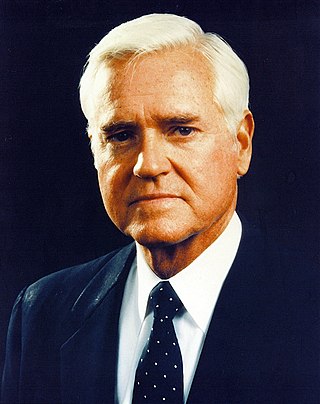
Ernest Frederick "Fritz" Hollings was an American politician who served as a United States senator from South Carolina from 1966 to 2005. A conservative Democrat, he was also the 106th governor of South Carolina, the 77th lieutenant governor of South Carolina, and a member of the South Carolina House of Representatives. He served alongside Democrat-turned-Republican Senator Strom Thurmond for 36 years, making them the longest-serving duo in U.S. Senate history. At the time of his death, he was the oldest living former U.S. senator.

The 1968 United States Senate elections were elections for the United States Senate. Held on November 5, the 34 seats of Class 3 were contested in regular elections. They coincided with the presidential election of the same year. The Republicans picked up five net seats in the Senate. This saw Republicans win a Senate seat in Florida for the first time since Reconstruction.

The 1966 United States Senate elections were elections on November 8, 1966, for the United States Senate which occurred midway through the second term of President Lyndon B. Johnson. The 33 seats of Class 2 were contested in regular elections. Special elections were also held to fill vacancies. With divisions in the Democratic base over the Vietnam War, and with the traditional mid-term advantage of the party not holding the presidency, the Republicans took three Democratic seats, thereby breaking Democrats' 2/3rds supermajority. Despite Republican gains, the balance remained overwhelmingly in favor of the Democrats, who retained a 64–36 majority. Democrats were further reduced to 63–37, following the death of Robert F. Kennedy in June 1968.

The 1962 United States Senate elections was an election for the United States Senate. Held on November 6, the 34 seats of Class 3 were contested in regular elections. Special elections were also held to fill vacancies. They occurred in the middle of President John F. Kennedy's term. His Democratic Party made a net gain of four seats from the Republicans, increasing their control of the Senate to 68–32. However, this was reduced to 67–33 between the election and the next Congress, as on November 18, 1962, Democrat Dennis Chávez, who was not up for election that year, died. He was replaced on November 30, 1962, by Republican appointee Edwin L. Mechem. Additionally, Democrat Strom Thurmond became a Republican in 1964, further reducing Democrats to 66–34. This was the first time since 1932 that Democrats gained seats in this class of Senators.
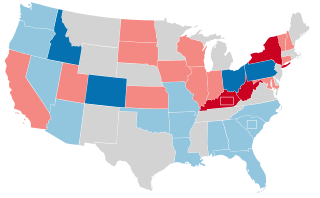
The 1956 United States Senate elections were elections for the United States Senate that coincided with the re-election of President Dwight D. Eisenhower. The 32 seats of Class 3 were contested in regular elections, and three special elections were held to fill vacancies. Although Democrats gained two seats in regular elections, the Republicans gained two seats in special elections, leaving the party balance of the chamber unchanged.

The 1954 United States Senate elections was a midterm election in the first term of Dwight D. Eisenhower's presidency. The 32 Senate seats of Class 2 were contested in regular elections, and six special elections were held to fill vacancies. Eisenhower's Republican party lost a net of two seats to the Democratic opposition. This small change was just enough to give Democrats control of the chamber with the support of an Independent who agreed to caucus with them, he later officially joined the party in April 1955.

Olin DeWitt Talmadge Johnston was an American politician from the US state of South Carolina. He served as the 98th governor of South Carolina, from 1935 to 1939 and again from 1943 to 1945. He represented the state in the United States Senate from 1945 until his death from pneumonia in Columbia, South Carolina in 1965. He has become infamously remembered for denying clemency to George Stinney, a 14 year-old African American boy who was wrongfully sentenced to death in 1944 after a trial that lasted for one single day, a conviction overturned 70 years later.
Marshall Joyner Parker was a Republican politician from the U.S. state of South Carolina.

The 1996 South Carolina United States Senate election was held on November 5, 1996 to select the U.S. Senator from the state of South Carolina. Popular incumbent Republican Senator Strom Thurmond, won re-election against Democratic challenger Elliott Springs Close for a seventh full term in office. The margin, however, was one of the closest in Thurmond’s 48-year Senate career. At the age of 93 years, 11 months and 3 days, Thurmond became the oldest person ever to be re-elected to the United States Senate. He eventually served out the entirety of what would be his final term and left the Senate on January 3, 2003, at age 100 years and 29 days.

The 1966 South Carolina United States Senate special election was held on November 8, 1966 to select the U.S. Senator from the state of South Carolina. The election resulted from the death of Senator Olin D. Johnston in 1965. Then Governor Donald S. Russell entered in a prearranged agreement with Lieutenant Governor Robert Evander McNair in which Russell would resign his post so that he could be appointed Senator. However, former Governor Fritz Hollings won the Democratic primary election and went on to beat Republican state senator Marshall Parker in the general election to win his right to fill the remaining two years of the unexpired term.
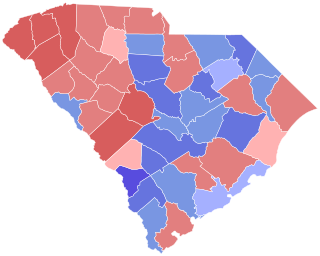
The 2004 United States Senate election in South Carolina was held on November 2, 2004. Longtime incumbent Democratic U.S. Senator Fritz Hollings retired, and Republican U.S. Representative Jim DeMint won the open seat. DeMint was the first Republican to hold this Senate seat since 1879, and the first Republican to ever be popularly elected to the seat.
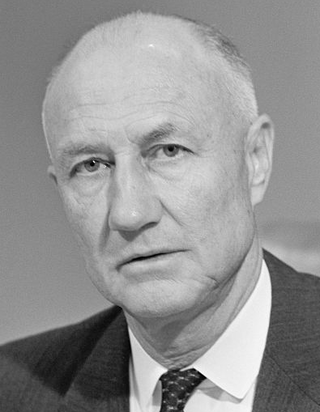
The 1966 South Carolina United States Senate election was held on November 8, 1966 to select the U.S. Senator from the state of South Carolina simultaneously with the special election to fill out the remainder of Olin D. Johnston's term.

The 1956 South Carolina United States Senate election was held on November 6, 1956 to select the U.S. Senator from the state of South Carolina simultaneously with the special Senate election. Incumbent Democratic Senator Olin D. Johnston handily defeated Republican mayor of Clemson Leon P. Crawford.
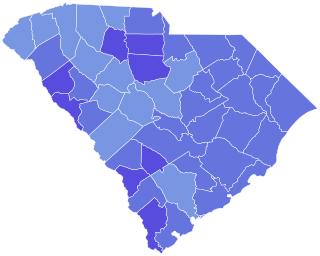
The 1968 South Carolina United States Senate election was held on November 5, 1968, to select the U.S. Senator from the state of South Carolina. Incumbent Democratic Senator Fritz Hollings easily defeated Republican state senator Marshall Parker in a rematch of the election two years earlier to win his second,, term.

The 1986 South Carolina United States Senate election was held on November 4, 1986 to select the U.S. Senator from the state of South Carolina. Popular incumbent Democratic Senator Fritz Hollings easily defeated Republican challenger Henry McMaster to win his fifth term. This is also the last US Senate election in South Carolina where the Democrat won with a double-digit margin. McMaster would much later be elected Governor in 2018.

The 1950 South Carolina United States Senate election was held on November 7, 1950, to select the U.S. Senator from the state of South Carolina. Incumbent Democratic Senator Olin D. Johnston defeated Strom Thurmond in a bitterly contested Democratic primary on July 11 and was unopposed in the general election.

The 1944 South Carolina United States Senate election was held on November 7, 1944 to select the U.S. Senator from the state of South Carolina.
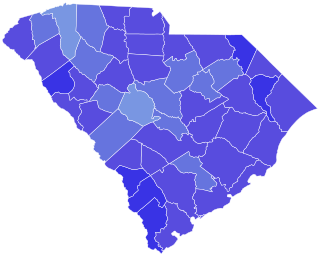
The 1974 South Carolina United States Senate election was held on November 5, 1974 to select the U.S. Senator from the state of South Carolina. Incumbent Democratic Senator Fritz Hollings easily defeated Republican challenger Gwen Bush to win his third term.

The 1938 South Carolina United States Senate election was held on November 8, 1938, to select the U.S. Senator from the state of South Carolina. Incumbent Democratic Senator Ellison D. Smith defeated Governor Olin D. Johnston in the Democratic primary. The general election was contested, but a victory by Smith was never in doubt.

The 1942 South Carolina United States Senate election was held on November 3, 1942 to select the U.S. Senator from the state of South Carolina. Incumbent Senator Burnet R. Maybank defeated Eugene S. Blease in the Democratic primary and was unopposed in the general election to win a six-year term.



















